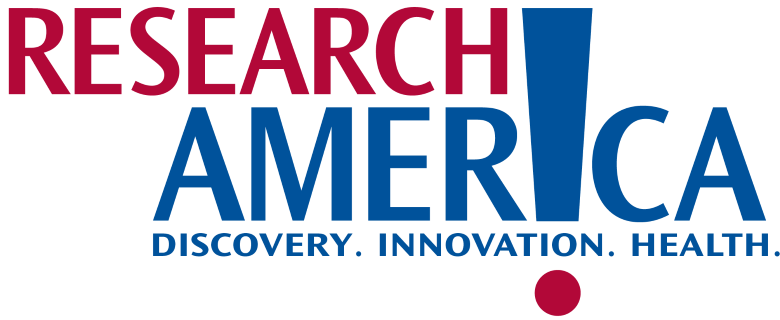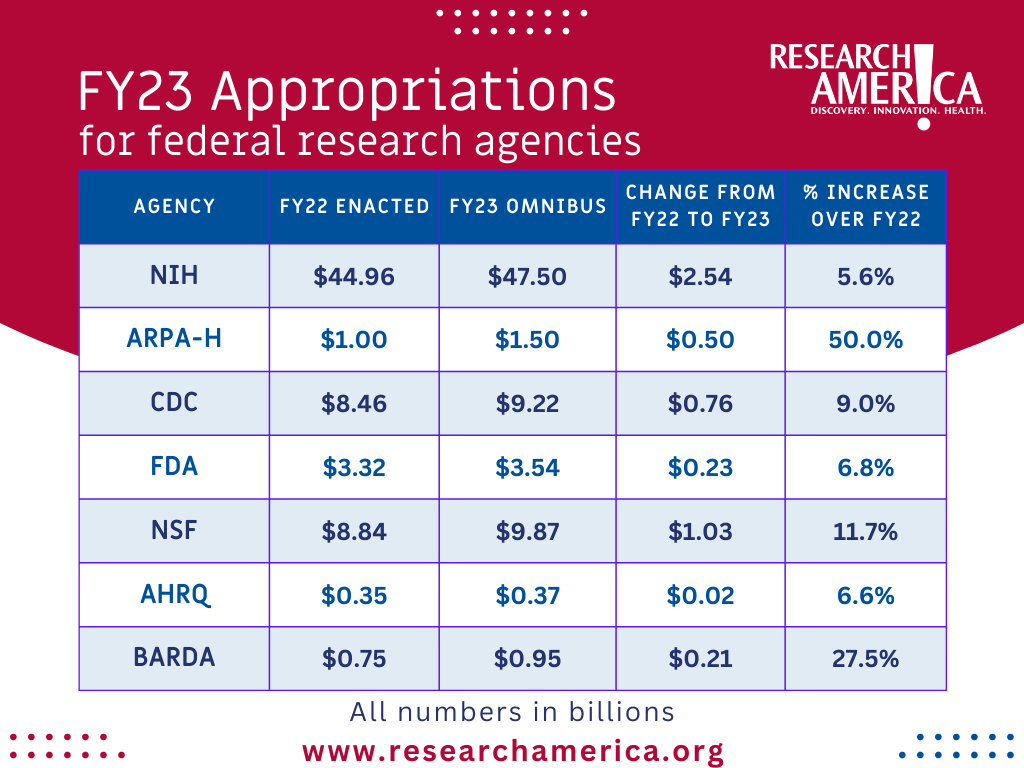Statement on Bipartisan Omnibus Appropriations for FY23

Dec. 29 Update: President Biden signed the Consolidated Appropriations Act, 2023, into law on Friday, December 23. We’ve created a chart showing how FY23 appropriations for federal research agencies compare to last year. (Note: there are some small discrepancies between the numbers in the chart and the press statement due to rounding differences; please use the numbers in the chart):

Original Press Statement:
Research!America applauds House and Senate leaders for achieving consensus and releasing the Consolidated Appropriations Act, 2023; we urge both chambers to pass it as soon as possible.
Among many critically important provisions, the omnibus appropriations legislation provides much needed FY23 funding increases for NIH, FDA, CDC, ARPA-H, AHRQ, and NSF. Boosting funding for these essential research agencies is a concrete, high-return investment in U.S. and global health, prosperity, and security.
We are grateful to House Appropriations Committee and Labor-HHS Subcommittee Chair Rosa DeLauro (D-CT), House Appropriations Committee Ranking Member Kay Granger (R-TX), and Labor-HHS Subcommittee Ranking Member Tom Cole (R-OK); as well as Senate Appropriations Committee Chair Patrick Leahy (D-VT) and Ranking Member Richard Shelby (R-AL); and Senate Labor-HHS Appropriations Subcommittee Chair Patty Murray (D-WA) and Ranking Member Roy Blunt (R-MO) for their leadership in prioritizing vital medical research and public health investments at the Department of Health and Human Services and other federal research agencies. This funding addresses the interests of individuals in the U.S. and around the world.
We would also like to extend a special thank you to retiring Appropriations Committee members, including Senate Committee Chairs Leahy and Shelby and Labor-H Ranking Member Blunt, who, throughout their storied careers, championed robust funding to drive medical progress forward.
- National Institutes of Health (NIH) — By providing an increase of $2.5 billion to the core budget of the NIH (5.6% over FY22), this agreement reaffirms strong, bipartisan support in Congress for funding critically important research conducted in every state across our nation. The American public agrees: A January 2022 survey commissioned by Research!America found that more than 9 in 10 Americans (92%) agree investing in research is important to finding new ways of preventing, treating, and curing illnesses.
- Advanced Research Projects Agency for Health (ARPA-H) — Research!America is also grateful to Congress for providing an increase of $500 million to ARPA-H’s start-up budget of $1 billion. This new health innovation incubator, modeled after DARPA and ARPA-E, is working to jumpstart multi-sector-fueled, high-risk/high-reward science aimed at shattering barriers and forging progress against existing and emergent health threats. Importantly, the bill also includes authorizing language that will guide the next phase of this agency’s unique and important trajectory.
- Centers for Disease Control and Prevention (CDC) — The bill provides an increase of $760 million for the CDC (9.5% over FY22). The CDC is our nation’s principal public health agency — working to safeguard the US against pandemics, the opioid crisis, antibiotic-resistant “superbugs,” disparities in health and health care, and everyday threats to communities nationwide. This funding is a down payment that will begin the revitalization of an agency that has faced years of inadequate funding, bolstering its capacity to address a range of public health threats, improve and expand the public health workforce, and respond to potential global crises.
- Food and Drug Administration (FDA) — Research!America is gratified to see a $226 million increase (6.5% over FY22) for FDA. This under-funded agency’s broad and critically important mission calls for additional resources. FDA oversees food, medical, and tobacco products valued at more than $2.8 trillion, which account for 20 percent of annual spending by U.S. consumers. We are thankful to see Congress respond to the need for more funding.
- Agency for Healthcare Research and Quality (AHRQ) — The bill provides an increase of $23.1 million for AHRQ (6.6% over FY22), a significant and much-needed increase for AHRQ—another historically underfunded agency. AHRQ empowers the research needed to ensure that medical progress translates into high quality, cost-efficient healthcare. AHRQ-supported research has saved countless lives and generated health care savings that far surpass its annual funding.
- National Science Foundation (NSF) — The bill provides an increase of $1.036 billion to NSF (12.0% over FY22), a historic increase that is a significant down payment on the resources urgently needed to assure U.S. competitiveness in the global economic arena. This increase includes $9.54 billion in the CJS appropriations bill and $335 million in supplemental funding. While this increase is less than funding authorized through the landmark CHIPS and Science Act, it represents a clear commitment to fulfilling the charge of the CHIPS and Science Act in advancing U.S scientific and technological competitiveness.
We are grateful for the progress made by both chambers of Congress to agree upon FY23 funding levels that empower the lifesaving, prosperity-producing, and security-enhancing progress Americans deserve and our nation needs. We look forward to swift action by Congress to pass – and the president to sign – the bill into law quickly in order for these vital agencies to begin utilizing this important funding.
Contact Tim Haynes, Senior Director of Communications, at 571-482-2737 or [email protected] with press inquiries.




